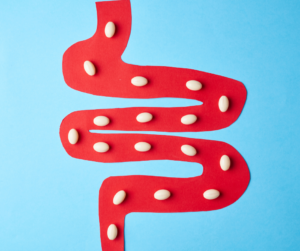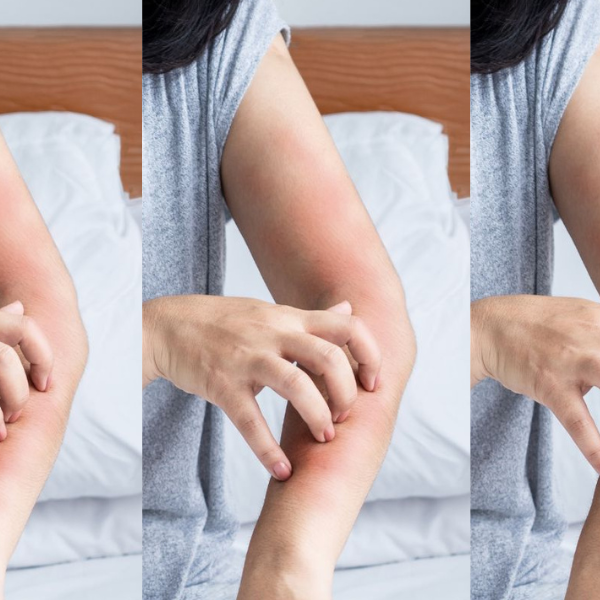Are you wondering how to stop perimenopause and menopause bloating? Let’s explore some options to beat the bloat!

Ultimate Guide: How to Stop Menopause Bloating
Bloating during perimenopause and menopause is quite common—and annoying, frustrating, and perplexing. Bloating often kicks in up to four years before menopause (i/e during perimenopause- the years before menopause) as hormone levels shift. Luckily, there are ways to handle this bloating and improve overall symptoms.
Thanks to hormone changes, menopausal bloating might come from extra water or gas in the belly. These hormone shifts also stir trouble in the gut, slowing digestion and making you more sensitive to foods. Your diet, stress, and lifestyle can make bloating worse, as can an already disrupted gut microbiome.
This blog post contains links for which I may earn a commission, at no extra cost to you.
Thankfully, there are many strategies to reduce menopause stomach bloating and boost gut health. Tweaking what you eat, changing a few lifestyle habits, trying natural cures, or seeking medical advice can help. Knowing what’s behind your bloating and applying the right fixes gives you power over your discomfort and hormone symptoms.
Understanding Menopause and Bloating
Menopause represents a bif shift, marking the closure of a woman’s reproductive phase. It usually occurs between the ages of 45 and 55, with the average age at 51. This period is characterized by various symptoms, bloating included, due to hormonal fluctuations in perimenopause and menopause.
Stages of Perimenopause and Menopause
The years leading up to menopause, perimenopause, may span several years. It can be defined by erratic hormone levels, including estrogen and progesterone. Often starting in the 40s, it can extend for up to 8 years before actual menopause.
Perimenopause often starts with a phase of estrogen dominance and follows with a phase that varies between high and low estrogen symptoms, then low estrogen, all while progesterone is gradually declining.
Symptoms such as irregular periods, hot flashes, night sweats, insomnia, mood swings, weight gain, and bloating are common. A woman reaches menopause when she has gone 12 months without a period.
Common Symptoms of Menopause
Each woman’s menopause journey is unique, but there are some common symptoms. These include:
- Hot flashes and night sweats
- Mood swings and irritability
- Vaginal dryness and discomfort
- Sleep disturbances
- Bloating and digestive issues
Research from the University of Washington highlights bloating’s prevalence during perimenopause and menopause. It affects 38% of postmenopausal women versus 14% of those in perimenopause. The decline in estrogen can lead to water and gas retention, resulting in bloating.
Causes of Menopause Bloating
Menopause-related bloating roots in several causes, with hormonal shifts at its core. As women approach menopause, typically between 45 and 55, estrogen levels fluctuate and diminish. These changes bring about an array of symptoms, bloating included, often appearing up to 4 years before menopause begins.
Hormonal Changes During Menopause
Estrogen’s role in maintaining fluid balance is key. Heightened estrogen (estrogen dominance) in perimenopause triggers water retention, leading to bloating. As the system adapts to new hormonal levels, bloating may lessen. Yet, lower estrogen connects to microbiome changes in the gut, impacting digestion and fostering bloating. Gut bacteria’s role in estrogen processing means its drop can disturb digestive harmony.
Water Retention and Gas Retention
Menopausal bloating often stems from water and gas retention. Water retention causes body swelling and painful bloating and can be mistaken for menopausal weight gain.
Gas bloating can mainly come from disruptions in the microbiome, the environment of our gastrointestinal tract. It can result from diet changes, slow digestion, menopausal or psychological stress, air swallowing, and health issues like SIBO, autoimmune disease, antibiotic use, leaky gut, and more.
Changes in the Gastrointestinal Tract

Mood swings in menopause can interfere with digestion and affect the GI tract. Diminishing estrogen worsens IBS symptoms and throws off the gut’s balance.
Certain foods like sugar, gluten for some women, processed foods, and dairy for some women, can cause gut inflammation, contributing to bloating. Incorporating fiber and probiotics can help; more information is below. Likewise, probiotic supplements bolster the gut, which is essential in bloating management.
Diet, stress, and daily habits impact menopausal bloating. Simple changes like hydration, regular exercise, steering clear of certain trigger foods, quitting smoking, and lessening salt intake fight against bloating.
Yogurt and kefir, due to their probiotics, can be beneficial for digestive health and symptom reduction, as long as dairy is not a trigger for you. Other probiotic foods include sauerkraut, kimchi, miso, tempeh, pickles, and kombucha, to name a few.
Long-lasting, severe bloating calls for medical attention, as it might signal other issues. Serious conditions like ovarian cancer, cysts, or fibroids could be the cause, so be sure to see your healthcare provider if you are experiencing this.
How to Stop Menopause Bloating
Bloating related to menopause is frustrating and uncomfortable. Various strategies exist to diminish this symptom. Women can relieve bloating during menopause by making dietary changes, altering lifestyles, and using natural remedies.
Remaining hydrated is important to fighting menopausal bloating. Drinking enough water throughout the day helps with water retention and bowel movements. Add lemon or cucumber to your water to improve its benefits.
Changing your lifestyle can also help. Exercise boosts digestion, lessens water retention, and improves your well-being. Cardio and strength training are both recommended. Stress relief techniques like deep breathing, meditation, and yoga can lower stress-induced bloating.
Natural remedies can provide extra support. Herbs and vitamins are traditionally known for easing digestive issues and decreasing bloating. Ginger, fennel, peppermint, and chamomile are particularly helpful. Castor oil packs on the abdomen have also been shown to reduce inflammation and bloating.
In some cases, you may want to consider bioidentical hormone therapy (bioHRT). BioHRT can regulate hormonal balance and ease bloating. However, discussing this with your healthcare provider is essential due to potential side effects. If needed, diuretics (a prescription medicine or natural) can be an option for managing water retention and bloating.
By applying these remedies, women can find substantial relief from menopause-related bloating. It’s important to remember that every woman’s menopause experience is different. It may take some experimentation to find the best solutions for you.
Let’s dive deeper for more ideas to help reduce your menopause bloating!
Dietary Changes to Reduce Bloating
Adopting a hormone-balancing diet focused on reducing bloating is helpful for many of the above-mentioned menopause symptoms.
Some foods contribute to bloating and gas, which is more common during menopause. The body becomes more sensitive to hormonal changes. To decrease symptoms, try to avoid or limit:
- Fatty and fried foods that hinder digestion and cause bloating
- Carbonated beverages, as they introduce extra gas into your system
- Added sugars. Sugar from natural foods like fruit is fine as long as it’s not in excess, but any non-native sugar can feed bad gut bacteria and cause more bloating.
- Artificial sweeteners and sugar alcohols that may cause bloating via gut fermentation
- Try giving up gluten and non-probiotic dairy (cheese, milk, ice cream, sour cream) for 30 days, then reintroducing one group at a time every 4 days to see if these trigger bloating. If they do, you may want to dive deep into my gut health videos on my YouTube channel.
Probiotic-Rich Foods for Digestive Health
To review, adding probiotic-rich foods to your diet supports digestive health and helps reduce bloating. Probiotics, or beneficial bacteria, maintain a healthy gut and regular bowel functions. Good sources of probiotics include:
- Yogurt and kefir, packed with Lactobacillus acidophilus and other live cultures
- Fermented veggies like sauerkraut and kimchi are also beneficial
- Miso, a fermented soybean paste, enhances the digestive system
- Tempeh, a soy product fermented as a meat substitute, improves gut health
- Kombucha, fermented tea full of probiotics, supports a healthy gut, just be sure to read the label and make sure it doesn’t have too much added sugar. A goal for daily added sugar is less than 25 grams so plan accordingly.
Staying Hydrated

Staying well-hydrated is key to preventing bloating from water retention in menopause. Drink at least half your body weight in ounces of water, up to 100 ounces per day.
Also, consume foods that hydrate, including:
- Watermelon, which is 92% water and rich in potassium
- Cucumber, with 96% water and anti-inflammatory benefits
- Zucchini, a low-cal vegetable with a high water content
- Herbal teas like peppermint, ginger, and fennel soothe digestion and reduce bloating
- Coconut water provides natural electrolytes to balance fluid levels
Coffee and alcohol can actually dehydrate you, so keep that in mind when considering your hydration needs. It’s best to limit coffee to less than 12 ounces per day, and alcohol to equal or less than 7 drinks per week. Alcohol also impairs hormones in other ways, so the more you can reduce it even below this guideline, the better off you will be in perimenopause and menopause.
These dietary and hydration shifts can significantly reduce bloating during menopause. It’s important to stay mindful and to consult healthcare providers for persistent or worsening symptoms.
Lifestyle Modifications for Bloating Relief
Managing menopause-related bloating involves both dietary changes and lifestyle tweaks. Incorporating exercise and stress management is crucial. They can reduce bloating symptoms and enhance a sense of well-being during menopause.
Regular Exercise
Exercise is also key in reducing bloating for menopausal women. Including both cardio exercises and strength training in your routine is ideal for gut health and hormone balance. Recommended activities are:
- Brisk walking or jogging
- Swimming or water aerobics
- Cycling or spinning
- Yoga or Pilates
- Resistance training with weights or bands
Working out for at least 30 minutes daily reduces water retention and improves circulation. Exercise can not only help move air pockets in your digestive system but also lower overall stress, improve cortisol, estrogen, and progesterone balance, and reduce inflammation.
Doing cardiovascular activities like brisk walking, jogging, swimming, water aerobics, cycling, spinning
Stress Management Techniques
Stress worsens bloating in peri and menopausal women by affecting digestion and increasing gut sensitivity. Estrogen levels impact gut health and stress response. This can lead to conditions like irritable bowel syndrome (IBS) and bloating. Managing stress is essential for gut health, as well as hormone balance during these years.
Effective stress reduction methods include:
- Deep breathing exercises. Try 3 rounds of 4-7-8 breathing. 4-7-8 is breathing in for 4 counts, holding for 7 counts, and exhaling for 8 counts. Do this type of breathing three times in a row, a few times per day, especially during times of stress.
- Meditation or mindfulness practices. I like apps like Aura (try this 7-day free trial for this amazing app), Calm, or Insight Timer for guided meditations. They also have prayers, guided deep breathing, manifestation exercises, sleep stories, mindfulness guidance, and more! There are also free videos on YouTube and other health streaming apps.
- Yoga or tai chi provides a different benefit from traditional exercise. Yoga and tai chi are slow-form movements that involve connecting with your breath and body. They enhance relaxation and mindfulness.
- Progressive muscle relaxation is another mindfulness activity that connects you to your body and can help with sleep. Guided programs for this are available on YouTube and on Aura, Calm, Insight Timer, and other mindfulness apps.
- Engaging in hobbies or activities that bring joy and relaxation. Using the creative side of your brain can reduce stress. This could be painting, crafting, gardening, or anything that brings you joy and peace.
Additionally, taking care of yourself and making time for relaxation is crucial for stress management. Getting enough sleep (7 to 9 hours is recommended), balancing work and life, and seeking support from family or a therapist can help you reduce stress. This, in turn, improves your digestive system’s health.
By adding regular exercise and stress-relief methods to your daily life, you can help tackle menopause-induced bloating. These changes, when combined with dietary adjustments, offer substantial relief from bloating. They make the menopausal transition more comfortable and full of energy.
Natural Remedies for Menopause Bloating
Menopause and perimenopause bloating can make life uncomfortable for many women. Natural remedies offer support by managing this symptom. Including certain herbs, vitamins, and supplements in your daily routine may ease digestive issues and lessen bloating during this transition.
Herbs and Vitamins to Alleviate Bloating

Ginger is well-known for its digestive benefits. Its carminative properties aid in digestion and reduce bloating. Research indicates that taking around 1,200 mg of ginger supplements daily quickens stomach emptying.
This helps ease bloating and stomach discomfort. Fennel, peppermint, and chamomile offer digestive relief too. They can be consumed as teas or supplements. Here’s a blend I love for bloating! And here’s one for overall digestive wellness including helping with bloating, diarrhea, constipation, and more.
Magnesium can play a vital role in bloating management. A 200- 800 mg dose can significantly reduce fluid retention and bloating. However, if the dose is too high for you, magnesium can cause loose stools, so start slowly and reduce your dose if you start getting loose stools. Always talk to your healthcare provider before starting any new supplements or nutrients.
Chasteberry supplements can help decrease bloating, as this herb can help balance hormones and improve estrogen-to-progesterone ratios.
Probiotic supplements, with select beneficial bacterial strains, help with bloating and inflammation in menopausal women. They can also alleviate IBS-type symptoms and constipation symptoms. Evidence shows that these supplements can lessen bloating and constipation in menopausal women.
In choosing a probiotic I often recommend one with both lactobacillus and bifido strains, with at least 12 different varieties of strains. Here’s a great one for women’s health.
Castor Oil Packs for Bloating Relief
Castor oil packs have been relied upon for centuries to reduce bloating. They stimulate circulation and lessen discomfort. To use, soak a clean cloth in castor oil, apply it to your abdomen, and cover it with a warm compress or heating pad.
For a less messy version, I love the Queen of Thrones castor oil pack. It has ties that wrap around your body, which helps the castor oil from going everywhere. However, it’s still recommended to wear an old shirt when using castor oil packs around your abdomen or trunk.
Leave the pack on for 30-60 minutes while relaxing. You can repeat this process 2-4 times each week as needed for bloating relief.
Alongside these remedies, a diet full of fiber and prebiotics is beneficial for gut health. For optimal digestive health aim for 30-35 grams of fiber daily. Prebioitic foods are rich in fiber, and can help feed the good bacteria in your gut. They include:
- garlic
- onions
- green bananas
- asparagus
- Jerusalem artichokes
- Chicory Root
- Dandelion
- Oats
If you find any of these foods or probiotics makyouur more bloated be sure to seek out a practitioner trained in gut health and check out my gut health playlist on my YouTube channel.
It’s crucial to consult a healthcare provider before beginning any new supplement plan, especially with existing medical conditions or medications. Mixing natural remedies, lifestyle changes, and diet adjustments is a holistic way to combat menopause bloating but all supplements might not be safe for everyone.
How to Stop Menopause Bloating with Medicine
For numerous women, menopausal bloating can be managed with lifestyle changes and natural remedies. Yet, some may need medical interventions for severe or persistent symptoms. Bioidential hormone therapy is a key treatment for menopausal bloating. It involves using estrogen and/or progesterone to stabilize hormone levels, which can reduce water retention and bloating.
A 2022 study in the International Journal of Women’s Health highlights the link between hormonal shifts, estrogen, and the gut microbiome. It indicates that hormone therapy could address digestive problems by improving gut microbiome diversity. I have seen this connection firsthand in my functional medicine practice as well.
Discussing hormone therapy with a healthcare provider is important due to potential risks.
Other options for managing menopause bloating include:
- Water-reduction pills (diuretics): These medications aim to lessen water retention and bloating by increasing the body’s fluid excretion.
- Antibloating medications: These medications are designed to reduce gas and bloating by aiding the elimination of excessive gas.
Differentiating Between Bloating and Weight Gain
In the menopausal transition, knowing the difference between bloating and weight gain is helpful. They both lead to discomfort and body shape changes but need different solutions. Bloating often comes from a swollen belly, feeling full, and a tight waist. Such bloating might start 4-8 years before menopause, mainly due to changing estrogen levels. Water and gas retention, along with diet changes, slow digestion, stress, and various health issues, can boost bloating.
For gas bloating, trapped air in your gut can be the culprit. Eating slowly, skipping carbonated drinks, and having light meals can help manage it. Water retention, however, makes different body parts swell. You might need to drink more water, eat less salt, and follow a better lifestyle (see all of the ideas above).
Weight Management During Menopause
Unlike bloating, weight gain during menopause is a steady process. It usually leads to more overall weight and fat around the middle. Women might add around 4.5-8 or more pounds during perimenopause and after menopause. This process can kick in due to hormone changes, causing more hunger for fatty, sugary, and salty foods.
Check out my other blogs on weight in perimenopause and menopause, and see the ideas on my YouTube channel for more info.
Although telling bloating and weight gain apart can be tricky, addressing them is vital. Lifestyle choices, including what you eat, how active you are, and how you manage stress, are very important. Remember, if bloating is severe or won’t go away, seeing a doctor is smart. They can check for any other health issues and set up a plan just for you.
When to Seek Medical Attention for Bloating
Bloating, often a common issue for women entering menopause, should not be taken lightly. Intense, long-lasting bloating, persisting even after lifestyle or diet changes, might indicate a bigger health problem. It’s imperative to see a doctor if the bloating comes with severe pain or other troubling symptoms.
Look out for signs that your bloating requires medical attention:
- Abdominal pain that sticks around or gets worse
- Unexplained weight loss or sudden weight gain, or big changes in how much you eat
- Unusual bowel habits, like constipation or diarrhea that won’t quit
- Bloating with fever, nausea, or vomiting
- Rectal bleeding or spotting blood in your stool
Sometimes, bloating issues during menopause could point to serious conditions. This includes problems like inflammatory bowel disease (IBD) or even ovarian cancer. Recent studies also show IBS could actually worsen during and after menopause.
Your healthcare provider will likely run tests to pinpoint the bloating’s source. This might involve physical checks, blood work, imaging tests, or colonoscopies.
Remember, bloating might be part of menopause, but it’s wise to check with a doctor if it lingers or causes real discomfort. Getting early guidance from a health professional is key. It helps ensure better digestive health and well-being as you navigate this new stage in life.
Conclusion
Menopause and perimenopause can bring about bloating, a common, uncomfortable issue for many women. This symptom is tied to hormonal changes, retention of water, and shifts in digestion. Knowing this, women can tackle the bloating by adjusting their diets and lifestyles.
Eating the right foods and avoiding the wrong ones helps. So does introducing more probiotics into your diet. Exercise and stress reduction are key, too. They can lessen bloating during menopause.
Some find relief in natural solutions, like specific herbs and vitamins. Yet, for others, a doctor’s help may be the best route.
It’s important to take care of your gut health. This is because perimenopause and menopause may reduce the variety of good bacteria in your digestive system. This could make digestive problems worse.

Dr. Shelley Meyer is a board-certified family physician and Institute of Functional Medicine-certified functional medicine physician, as well as a Registered Dietitian. She is passionate about helping women navigate the roller coaster of perimenopause and postmenopause. She has her own Functional Medicine Practice in Denver, Colorado.




Leave a Reply
You must be logged in to post a comment.